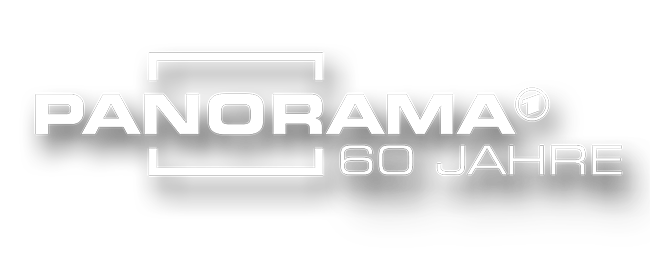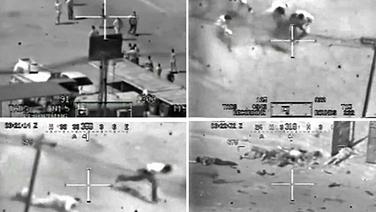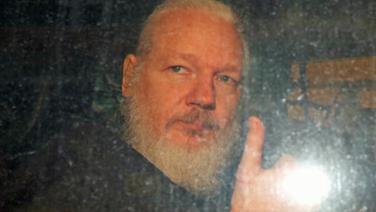Wanted for espionage - the hunt for Wikileaks
The case of Julian Assange is disturbing for many people. Didn't he help Trump get elected? What about the rape allegations in Sweden? Isn't he an unpleasant human being, a narcissist? Is it true that he never washes? Hasn’t he become a Russian agent? For others, however, Assange is a hero for exposing the crimes of powerful western governments, and his difficulties are a result of a systematic slander campaign against him. Which version is true?
Panorama decided to take one day in the long and complicated saga of Wikileaks founder Julian Assange and to dissect it. It’s April 11, 2019, the day when he was removed from the Ecuadorian embassy and arrested by the UK police. What happened that day? How did the UK government respond? Why don’t we know there were other people connected to Wikileaks who found themselves in trouble with the law that day? And what does April 11, 2019 tell us about the Assange saga?
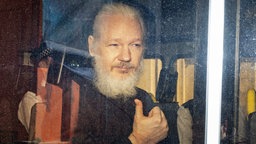
What happend the day Julian Assange was removed from the Ecuadorian embassy and arrested by the UK police?
Assange had sought refuge in the Ecuadorian embassy in 2012 because, since losing his appeal against a Swedish extradition request, he believed it was his only chance to avoid ending up in U.S. custody. Sweden had applied for his extradition from the UK so that he could be questioned about sexual molestation allegations. Assange argued that he had already appeared for questioning in Sweden and had even received permission to leave Sweden from the Swedish authorities. He believed extradition to Sweden was the first step in a process that would lead to him spending decades of prison in the United States, where the US government and an active Grand Jury were investigating if Assange could be prosecuted for publishing evidence of American war crimes. Many observers considered Assange's worries a paranoid self-serving lie and argued he could leave the embassy at any time. Assange was unlikely to face prosecution in the United States, one commentator argued, and the only reason he wouldn’t leave the embassy was pride.
The government of Ecuador under Rafael Correa granted Assange asylum because they were convinced there was a danger that he could be extradited to the United States and tried for his journalistic work. Correa's successor, Lenin Moreno, established closer ties to the United States and since becoming president of Ecuador in 2017 had been involved in increasingly hostile public disputes with Assange and Wikileaks.
THE ARRESTS: LONDON AND QUITO
By April 2019, it was clear to all observers that Assange’s days in the embassy were numbered. On April 4, Wikileaks had gotten hints from sources apparently still in the Ecuadorian government or close to it that the arrest of Assange was imminent. They tweeted, "A high level source within the Ecuadorian state has told Wikileaks that Julian Assange will be expelled within 'hours to days'… and that it already has an agreement with the UK for his arrest."
But many observers refused to take the tweet from Assange seriously. One criticized him for "crying wolf" too many times. However Ruptly, the news service of the Russian state television broadcaster Russia Today (RT), did take the tweet seriously.
April 4, 2019 - RUPTLY (news service of the Russian state television broadcaster RT), HEADQUARTERS, POTSDAMER PLATZ BERLIN - Laura Lucchini:
On April 4, Wikileaks tweeted that a high-level source told them about the imminent eviction of Julian Assange from the Ecuadorian Embassy. We sent our crew to the embassy immediately and worked out a schedule for them to stay in front of the embassy uninterrupted and do a livestream. We decided on 24/7 shifts. At the beginning, other media outlets were live and doing shifts as well, but we saw camera crews eventually leaving. After a few days, we were the only camera team out in front of the embassy. The whole week we ran a live feed. (Panorama, interview with Lucchini)
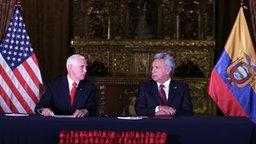
Vice President Mike Pence and Lenin Moreno, President of Ecuador.
The Ecuadorian government, which until 2016 had been ruled by leftist president Rafael Correo, had, under the new president, Lenin Moreno, moved steadily closer to the United States and the United Kingdom, and was arguing that Assange had violated the terms of his asylum. In July 2018, Vice President Mike Pence visited Ecuador, only the third visit by a US vice president since 1958 and raised the issue of Julian Assange. In October 2018, Ecuador renewed military cooperation with the United States, something Moreno's predecessor had stopped. In March 2019, the Washington-based International Monetary Fund approved a $4.2 billion 'extended fund facility' for the Ecuadorian economy.
By April 2019, President Lenin Moreno was in open conflict with Assange, declaring publicly that Assange was a "stone in our shoe", and accusing Assange of trying to destabilize his government.
April 5, 2019 - UNITED NATIONS OFFICE OF THE HIGH COMMISSIONER, GENEVA - UN Special Rapporteur on torture, Nils Mezler:
In my assessment, if Mr. Assange were to be expelled from the Embassy of Ecuador, he is likely to be arrested by British authorities and extradited to the United States. Such a response could expose him to a real risk of serious violations of his human rights, including his freedom of expression, his right to a fair trial and the prohibition of cruel, inhuman or degrading treatment or punishment. I therefore urge the Government of Ecuador to abstain from expelling Mr. Assange from its Embassy in London, or from otherwise ceasing or suspending his political asylum until such time as the full protection of his human rights can be guaranteed.
EARLY APRIL - ECUADORIAN EMBASSY, LONDON - Kristinn Hrafnsson, editor in chief of Wikileaks:
In our last meeting in the embassy, we had to sit in the corner of the meeting room and communicate by whispering in each other’s ear or write words on a piece of paper in order to be out of view of the two surveillance cameras. The cameras had months earlier been upgraded to highest resolution and with audio recording capability added. The new security guards were hostile and intimidating. They were prison guards, not security guards. Julian and I both knew his stay in the embassy was soon coming to an end. We hugged when I left. (Panorama, interview with Hrafnsson)
Wikileaks and Assange were also not shy about criticizing the Moreno government. Wikileaks claimed that the Ecuadorian government had leaked lists of journalists who came to visit Assange for editorial meetings, and that his stay in the embassy had become a kind of "Truman Show". On April 10, Wikileaks gave a press conference in London which detailed alleged extortion attempts by criminals in Spain against Wikileaks. The extortionists, Wikileaks claimed, had offered them Assange’s legal and health records, and hundreds of hours of video material (which were somehow obtained from the Ecuadorian authorities), in return for 3 million euros. If they did not get the money, the extortionists threatened to release the material. Wikileaks had informed the Spanish police, which plotted a sting operation that led to the arrest of suspects.
The Wikileaks press conference accused the Ecuadorian authorities of not securing the personal material of Assange and engaging in serial harassment of Assange. Wikileaks editor in chief Hrafnsson believed that it was the announcement of the press conference that triggered events that led to Assange's arrest. The Associated Press reported that President Moreno made the decision to cancel Assange’s citizenship and asylum at 4pm on April 9 - i.e. the day before the press conference. Associated Press (AP) also reported that President Moreno gave the British authorities 36 hours to evict Assange. AP gave a graphic account of Moreno's aides awake at 4 AM Quito time on April 11: "Huddled at a home in Ecuador's capital, President Lenin Moreno’s aides anxiously awaited word in the middle of the night on an operation that would soon make headlines around the world: the arrest of WikiLeaks founder Julian Assange inside the country’s London embassy. 'We were waiting and waiting and thought,"Wow, something's wrong'."
While Moreno's aides waited, in London Assange told colleagues he had, he thought, had a good week so far. With the press conference, he believed he had shown he would not go quietly. He had heard that the deal with the British government to arrest him had been made weeks earlier. But he was still free, if one can say that, in his sunless 35 square meter room.
Weitere Informationen
10 AM - EUSTON STATION, LONDON - Kristinn Hrafnsson:
I was at Euston Station, on my way to Iceland. I had been in London doing the press conference. We knew that the arrest was imminent and worried that the press conference the day before might be a trigger. (Panorama, interview with Hrafnsson)
10:05 AM - ECUADORIAN EMBASSY, LONDON - HANS CRESCENT:
At 10:05, Julian Assange was called into the conference room for a meeting. Thinking that it might take a while, he brought a book with him, Gore Vidal’s "National Security State". He waited. Sitting next to him was a Wikileaks colleague who helped the stranded Assange perform errands. Less than 10 meters away, outside on the street in front of the embassy, a field producer from Ruptly was setting up her equipment. RT had been running a live feed in front of the embassy for the previous six days. Suddenly the feed went down. (Panorama, interview with Hrafnsson)
Ruptly Field Producer Julia Maretto:
It was all very quiet in the street in front of the embassy. I was setting up the equipment when I saw the police came in and parked in front of the embassy entrance, so in front of the camera. It seemed like just another ordinary day. I started then moving the equipment to get closer. As the street was almost empty and police came in really suddenly and without big movement or alarm, I thought it was a drill; I moved over to film it anyway. (Panorama, interview with Maretto)
10:10 AM
The Wikileaks staffer in the conference room with Assange later explained that the ambassador entered the conference room accompanied by security guards and a member of the Ecuadorian secret service. The ambassador said there was a letter for Assange. He then opened the envelope and read the letter out loud. The letter informed Assange that his asylum and citizenship were revoked and that he was to leave the embassy immediately. Without saying anything else, the ambassador left the room. When he opened the door, Assange and his colleague could see that a group of men and women, including members of the Metropolitan Police, were just outside, apparently waiting for him. Assange declared that the reversal of his asylum and citizenship were a violation of the Ecuadorian constitution, and that he wanted to appeal. He got up to return to his room. The Associated Press subsequently reported that the leadership team around the Ecuadorian president was concerned that Assange had a "doomsday" button in his room, and that if he was allowed to return to his room, he could push the button. Assange’s assistant was shoved aside; Julian Assange was tackled, handcuffed and brought to the front door of the embassy. Left behind in his room, his collection of hard drives, his computers, his legal defense papers, his notebooks and the many things he had accumulated over the previous seven years. (Panorama, interview with Hrafnsson)
10:17 AM - HANS CRESCENT, IN FRONT OF THE ECUADORIAN EMBASSY - Julia Maretto:
But it was not a drill! I remained calm and concentrated on getting the image, but while it was happening, as I saw him being carried out shouting 'UK must resist', it of course turned real and clear that the police was indeed arresting him and that almost nobody was witnessing this historical moment. We had been live the whole time, but actually the streaming had stopped unexpectedly at the moment when police arrived, so I fed the footage to the newsroom right after, and some minutes later other journalists, Assange supporters and curious people started arriving. I gave a better look around to find out I was really the only camera registering it. And then the van drove away and he was gone. (Panorama, interview with Maretto)
10:19 AM - RUPTLY HEADQUARTERS, POTSDAMER PLATZ, BERLIN - Laura Lucchini:
I heard the phone ringing on the Live Desk, and the producer on shift shouted, "He is out". I was in my office just after our daily editorial meeting. Shortly before Assange appeared our live streaming went down, and we still don't know why. The field producer was calling to inform that she had filmed everything. She sent in the recorded footage to the office and said she was the only camera filming. I thought we were witnessing an historical event. And I knew we had a world exclusive in our hands. Over 200 broadcasters around the world bought the footage from us. (Panorama, interview with Lucchini)
The van brought Assange to a holding cell at Westminster Court, just 15 minutes away, where he was charged with jumping bail in June 2012. The day was partly cloudy. Perhaps Assange, outside the embassy, but in the police van, felt the sun for the first time in seven years.
Weitere Informationen
10:33 AM - NEW SCOTLAND YARD, LONDON:
Julian Assange, 47, has today, Thursday 11 April, been arrested by officers from the Metropolitan Police Service (MPS) at the Embassy of Ecuador, on a warrant issued by Westminster Magistrates' Court on 29 June 2012, for failing to surrender to the court. He has been taken into custody at a central London police station where he will remain, before being presented before Westminster Magistrates' Court as soon as is possible. The MPS was invited into the embassy by the Ambassador, following the Ecuadorian government's withdrawal of asylum.
10:35 AM - FRONT LINE CLUB, PADDINGTON, LONDON - Kristinn Hrafnsson:
Then I saw the news. I got into a taxi and met with the others from the core group of Wikileaks at the Front Line Club near Paddington. We thought of holding a press conference there but it was then that we learned that Julian was brought to a holding cell at the Westminster Court, just a few minutes away. So we decided to go over there.
10:52 AM UK TIME - STOCKHOLM - Elisabeth Massi Fritz, lawyer for one of the accusers in the sexual molestation case against Assange in Sweden:
My client and I have just received the news that Assange has been arrested in London. The fact that what we have been waiting and hoping for nearly seven years is now happening comes, of course, as a shock to my client. We will do all we can to get prosecutors to reopen the Swedish preliminary criminal investigation so that Assange can be extradited to Sweden and prosecuted for rape. No rape victim should have to wait 9 years to see justice be served.
10:52 UK TIME - STOCKHOLM - Anna Ardin, accuser in Assange sexual molestation case:
I would be very surprised & sad if Julian is handed over to the US. For me this was never about anything else than his misconduct against me/women and his refusal to take responsibility for this. Too bad my case could never be investigated properly, but it’s already been closed. Almost 10 years after I reported Julian’s abusive behavior thousands of men (and some very aggressive women) are still wanting me to shut (the fuck) up - in the name of truth and transparency. Isn’t that kind of ironic?
10:53 AM - Julian Assange was arrested a second time - this time on behalf of the US extradition request.
11:52 AM - WHITEHALL, LONDON - Jeremy Hunt, Secretary of State for Foreign Affairs:
Julian Assange is no hero and no one is above the law. He has hidden from the truth for years. Thank you Ecuador and President Lenin Moreno for your cooperation with the Foreign Office to ensure Assange faces justice.
APPROXIMATELY NOON - UN Special Rapporteur on torture, Nils Mezler:
I was traveling by car, on my way from Italy to Switzerland when I heard the news of the arrest of Assange. The Ecuadorians had expelled Assange and stripped him of his asylum without any due process whatsoever. This is exactly what I had warned against.
Noon UK Time - Jacob Appelbaum, Wikileaks volunteer and journalist. Appelbaum had been contacted in NOVEMBER 2018 by the office of the District Attorney who is prosecuting Assange and offered immunity if he testified against Assange. Appelbaum refused.
It was warm outside when I got a message about Julian’s arrest. I had just had an appointment about a post-doctoral position. I cannot remember any physical sensation other than a tightness in my chest. The alarm about threats on Julian had sounded so many times over the last seven years. I noted upon hearing of his arrest that the alarm had been just as loud as ever and it was me who had become deaf to the sound. I took precautions when traveling home and wondered which other journalists they would come for next.
1:11 PM LONDON - 8.11 AM UTC - ALEXANDRIA, VIRGINIA: Three hours after Assange was carried out of the embassy, District Attorney Zachary Terwilliger, lead attorney in the US Justice Department's case against Assange, gave the order to issue a proclamation of the charges against Assange.
US DEPARTMENT OF JUSTICE PRESS RELEASE: Julian P. Assange was arrested today… The indictment alleges that in March 2010, Assange engaged in a conspiracy with Chelsea Manning, a former intelligence analyst in the U.S. Army, to assist Manning in cracking a password stored on U.S. Department of Defense computers… Cracking the password would have allowed Manning to log on to the computers under a username that did not belong to her. Such a deceptive measure would have made it more difficult for investigators to determine the source of the illegal disclosures.
Terwilliger was eventually to charge Assange with espionage, but on this day, the day that his arrest would be reported around the world, the charge was conspiracy to commit computer intrusion. The Washington Post later reported that two veteran prosecutors from Terwilliger's office had opposed the strategy of charging Assange with espionage, arguing that there was no distinction between what Wikileaks does and other national security reporting.
But suddenly other arrests seemed possible.
- Teil 1: Arrests in London
- Teil 2: Arrests in Quito
- Teil 3: Epilogue
